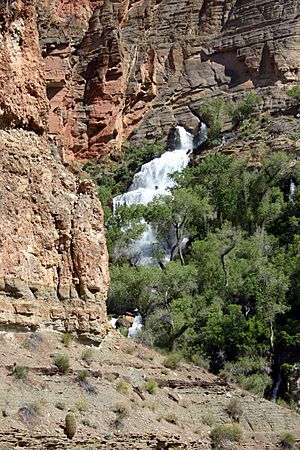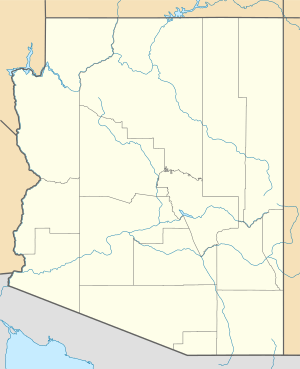Thunder River (Tapeats Creek tributary) facts for kids
Quick facts for kids Thunder River |
|
|---|---|

Thunder River in the Grand Canyon National Park
|
|
|
Location of the mouth of Thunder River in Arizona
|
|
| Country | United States |
| State | Arizona |
| County | Coconino |
| Physical characteristics | |
| Main source | Thunder Springs Grand Canyon (North Rim) 36°23′45″N 112°27′28″W / 36.3958°N 112.4578°W |
| River mouth | Tapeats Creek Grand Canyon 2,549 feet (777 m) 36°23′31″N 112°27′05″W / 36.3919°N 112.4513°W |
Thunder River is a unique river found entirely inside the Grand Canyon National Park. It flows southeast from its starting point near the North Rim of the canyon. The river ends when it joins Tapeats Creek.
This river is very short, only about 0.5-mile-long (0.80 km). It is one of the shortest rivers in the United States. It also drops about 1,200 feet (370 m) (366 meters) very quickly over many waterfalls. This makes it the steepest river in the country. It is also unusual because a river (Thunder River) flows into a creek (Tapeats Creek).
Contents
Exploring Thunder River's Past
When Was Thunder River Discovered?
While Tapeats Creek was named by the second Powell Expedition in 1871–1872, they did not find Thunder River. People from Europe and America first discovered the river much later, in 1904.
The Thunder River Trail
You can reach Thunder River by hiking the Thunder River Trail from the North Rim. This trail is only open from mid-May to late October each year. The first parts of the trail were built in 1876. At that time, people thought there might be gold in the area. They needed a way to get there.
More work on the trail happened starting in 1925. The United States Forest Service began the work. Later, the National Park Service continued it. The final parts of the trail, leading to Tapeats Creek, were finished in 1939.
Where Does Thunder River Start?
Thunder Spring: The River's Source
Thunder River gets its water from Thunder Spring. This is the second-largest spring on the North Rim of the Grand Canyon. The water comes out of a deep cave system in the Muav Limestone rock. The water is about 54 °F (12 °C) (12 degrees Celsius).
Since the spring flows all year round, Thunder River is a perennial river. This means it always has water flowing in it. In 1970, experts estimated that the spring released about twenty-one million US gal (79,000,000 L; 17,000,000 imp gal) (79 million liters) of water into the river every day.
Plants and Animals Around Thunder River
What Grows Near the River?
Near Thunder Spring, you can often see Fremont's cottonwood trees and white sumac plants. Along the river itself, there are willow trees and seepwillow shrubs. Other plants include crimson monkeyflower and maidenhair fern. These plants like to grow near water.
Insects in the Water
Many small water creatures live in the creek. Common aquatic invertebrates found here include stoneflies and caddisflies. These insects are an important part of the river's ecosystem.
 | Charles R. Drew |
 | Benjamin Banneker |
 | Jane C. Wright |
 | Roger Arliner Young |


